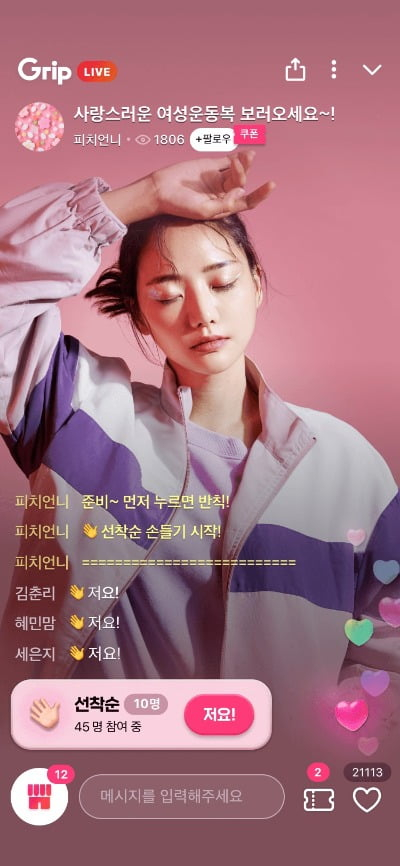E-commerce
Live commerce app Grip aims to expand into Japan, US in 2024
The e-commerce platform has grown fast since COVID-19 and is on track to post $226 million in transactions this year
By Sep 20, 2023 (Gmt+09:00)
2
Min read
Most Read
LG Chem to sell water filter business to Glenwood PE for $692 million


Kyobo Life poised to buy Japan’s SBI Group-owned savings bank


KT&G eyes overseas M&A after rejecting activist fund's offer


StockX in merger talks with Naver’s online reseller Kream


Mirae Asset to be named Korea Post’s core real estate fund operator



Imagine you're using a shopping app. You talk to the seller, ask questions and receive answers in real-time on a livestream video. Now and then, the seller holds a quiz or a lucky draw and sends gifts to the winners. On this app, the seller-buyer relationship is almost like a friendship.
Grip, the South Korean app that offers shopping experiences like these, runs some 1,300 livestream videos connecting merchants and customers every day. It also provides live commerce management solutions to about 30 retailers, including CJ Olive Young, Shinsegae Department Store and Kurly Inc.
Since the COVID-19 pandemic, Grip has grown fast by helping small businesses boost their online sales, the company's CEO Hanna Kim in an interview with The Korea Economic Daily on Wednesday.
With some 20,000 sellers and 2.3 million monthly active users, its transaction value is poised to break 300 billion won ($225.6 million) this year, Kim said. It surged from 80 billion won in 2021 to 210 billion won last year, she added.
Grip became Korea's first live commerce platform in Korea when it was founded in 2019. Two years later, Korean tech giant Kakao Corp. bought a nearly 50% stake in the app operator for 180 billion won.

“The app is not just a shopping platform. It focuses on communications between merchants and customers: the users follow the sellers they like, become loyal customers and develop the platform as a large community,” said Kim.
Some top influencers have hundreds of thousands of followers, while others have as just 5,000 to 8,000, she said. A majority of users are women ages 25 to 45, who found the platform an interesting place to chat with other shoppers during the pandemic, Kim added.
Like many platform startups, Grip is introducing fun into the sales process to attract younger customers. For example, sellers award coupons to users who watch a live video for a specified amount of time.

The app recently launched a promotion that waives livestream and sales fees to new sellers for one month. It's also developing another app to help global users launch businesses overseas.
“We will expand globally in the first half of next year. We see Japan and the US as our primary overseas markets and are holding discussions with potential partners in Southeast Asia,” said Kim.
“In the future, we may connect a shoemaker in Milan, Italy, to haenyeo, or female divers, in Tongyeong on Korea's south coast. People will be able to communicate with each other in their own language using artificial intelligence and translation technology,” she added.
Live commerce platforms will evolve to resemble social media that connects merchants and online customers, the CEO added. Grip will create a service that connects Grip users through Kakao Talk, Korea’s top mobile messaging app.
“The word ‘saneun’ in Korean has two different meanings: buying or living. So we wanted to make shopping experiences on our app more humane, where sellers and buyers build close relationships and support each other,” Kim said.
Write to Jung-Rak An at jran@hankyung.com
Jihyun Kim edited this article.
More to Read
-
 Venture capitalLive commerce platforms like Grip to keep growing in Asia Pacific: Google
Venture capitalLive commerce platforms like Grip to keep growing in Asia Pacific: GoogleFeb 22, 2022 (Gmt+09:00)
3 Min read -
 Mergers & AcquisitionsKakao buys startup Grip, fueling e-commerce push
Mergers & AcquisitionsKakao buys startup Grip, fueling e-commerce pushDec 02, 2021 (Gmt+09:00)
2 Min read -
 E-commerceLive commerce app Grip aims to take over the world via shopping
E-commerceLive commerce app Grip aims to take over the world via shoppingApr 14, 2021 (Gmt+09:00)
3 Min read -
 Korean startupsLive commerce app Grip posts over $22 mn in transactions
Korean startupsLive commerce app Grip posts over $22 mn in transactionsJan 05, 2021 (Gmt+09:00)
1 Min read
Comment 0
LOG IN


